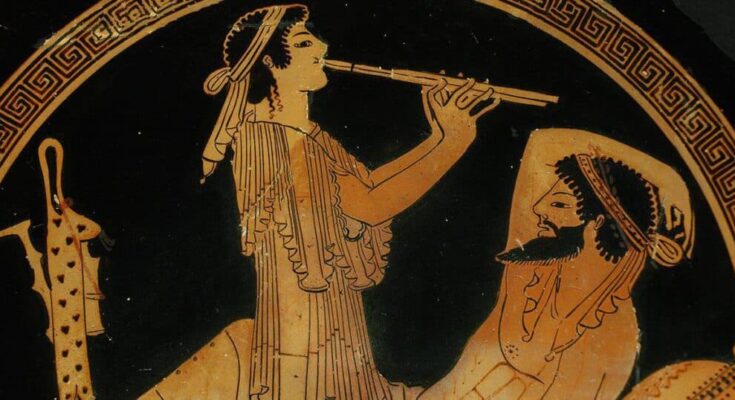
Aristoxenus of Tarentum is a relatively unknown Greek peripatetic philosopher who made groundbreaking contributions to the fields of music theory and rhythm, shaping ancient Greek music profoundly.
Even though he is considered to be the first musicologist in the Western tradition, his work and personality are not widely known and not many people are aware of his impressive life and contributions in this field.
The Life and Works of Aristoxenus
Aristoxenus was born in the Greek colony of Tarentum in southern Italy (Magna Graecia) around 375 BC. He was the son of a musician, something that influenced him fundamentally. As he was growing up, Aristoxenus studied music theory and philosophy in Athens, where he moved to get the best possible education, as Athens was a major educational center at the time. He was a pupil of the famous philosophers Xenophilus the Pythagorean and more importantly, Aristotle, who played a foundationally shaping role in his life.
Aristoxenus loved to write his ideas and soon became a prolific writer. It is said that throughout his life he completed a jaw-dropping 450 –or even more– works on a wide variety of topics including music, philosophy, and ethics, among many others.
Unfortunately, most of these works have been lost through time or haven’t been discovered yet. Only tiny fragments of his writings survive today, but they are enough to give us a glimpse into the world of Aristoxenus’ ideas. His most important surviving work is the ‘Elements of Harmony’, which is an incomplete musical treatise. This surviving piece is the fundamental source of our knowledge of ancient Greek music to this day, as it gives us valuable information about the way ancient Greeks approached music.
How Aristoxenus Shaped Ancient Greek Music
In direct contrast to other, earlier Pythagorean theorists who fundamentally based their music theory on mathematical ratios, Aristoxenus argued that the notes of musical scales should be seen and judged by the ear of the listener and those who enjoy listening to this melody and not by numbers. This is why he developed a truly influential theory of musical scales, as well as intervals, rhythm, and melody that was grounded in the way music was perceived and performed, rather than abstract theories that involved mathematics.
Furthermore, Aristoxenus introduced several other essential concepts, including the idea that musical sound proceeds by distinct steps in pitch, as well as the idea that the first element of music is the note above anything else. He then described different musical scales and modes, the ranges of the human voice, and a number of techniques of modulation between musical keys.
His work, ”Elements of Rhythm”, was indeed the first systematic treatment of musical metre and rhythm in the West, making his contribution to music foundational and tremendously important.

The Philosophical Approach of Aristoxenus
Aristoxenus, however, was not just a musician. As a philosopher, he followed a much more empirical approach, influenced, of course, by his teacher Aristotle. Aristoxenus strongly believed that music theory should be primarily based on real musical practice as judged by trained ears, not just abstract mathematics, an idea that had deep philosophical roots in its core.
This put Aristoxenus in opposition to the Pythagoreans of the time, who saw music as essentially mathematical and not empirical. For Aristoxenus, however, music was both an art and a science. It was much more than numbers or random sounds put together. It required both reason and perception to be properly understood.
Aristoxenus’ Influence on Ancient Greek Music
Based on the evidence we have on Aristoxenus, we can see that he had a seminal yet enormous influence on later music theorists in the ancient Greek world and beyond, as he dealt with elements that not many people had done before him. His works were being studied for centuries by many and his concepts shaped the later musical tradition of several regions of the ancient world in Greece and beyond.
A notable example would be the Roman architect Vitruvius, who relied heavily on Aristoxenus in his discussion of music. Additionally, in the Middle Ages, scholars like Boethius helped transmit the ideas of Aristoxenus to medieval Europe, spreading his work even further.
Today, although not known by many, Aristoxenus is recognized as a pioneering figure. He was the first to study music in a much more systematic, scientific way than his predecessors. He is also considered the originator of the fields of musicology, music theory, and music psychology in the West.
Even though only small fragments remain, his works do provide us with an invaluable insight into ancient Greek music and the origins of the Western musical tradition as a whole.



